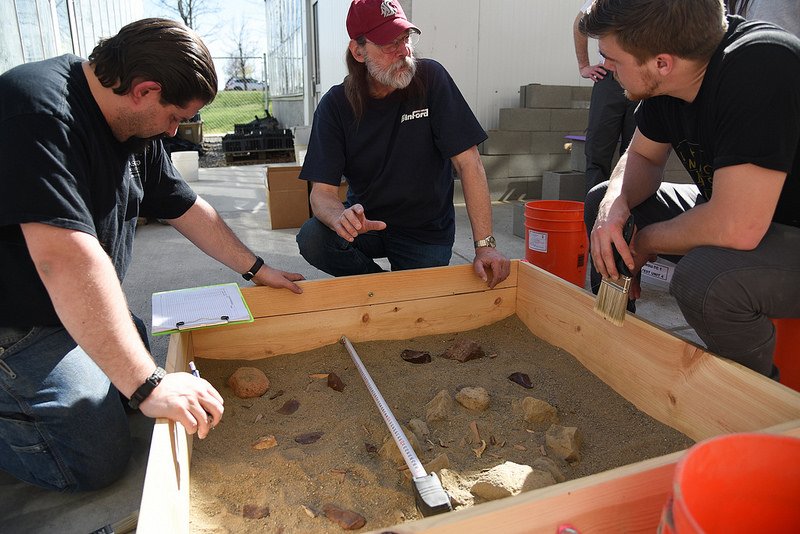
April 21, 2016 Class partners with tribe for authentic experience
By Maegan Murray, WSU Tri-Cities
 RICHLAND, Wash. – Students got to dig deep in a Washington State University Tri-Cities class recently, exploring archaeology while uncovering authentic materials provided by local Native Americans.
RICHLAND, Wash. – Students got to dig deep in a Washington State University Tri-Cities class recently, exploring archaeology while uncovering authentic materials provided by local Native Americans.
Professor Thomas Marceau spent 44 years as a professional archaeologist – 22 at the Hanford site. Through relationships formed there with the Wanapum people, he borrowed authentic artifacts, bones and other materials to bury in test boxes that students excavated and analyzed.
“We’ve spent the past few months going over the procedures archaeologists use in the excavation process,” he said of the new Introduction to Archaeology course. “I wanted to provide students the chance to try out everything they’ve learned on an actual dig.
“I thought it was important to have authentic tools for this,” he said. “Students get experience identifying real artifacts and materials.”
In addition to the artifacts provided by local Native Americans, the soil, excavation tools a

Professor Thomas Marceau, center, talks with students excavating five test boxes planted with authentic artifacts provided by the Wanapum Native Americans.
nd other materials were as close to real-world examples as possible.
“The sand we’re using in the test units is dry and dusty, mimicking the Hanford site in July and August,” Marceau said. “It’s hard to excavate. Students used trowels and brushes as their primary excavation tools as they do in the real-world setting.
“Each site has a different activity showing how Native American people made their living,” he said. For example, one of the test boxes held artifacts that might be left behind by an ancient woman grinding bones to get grease and marrow to eat and use. Others held remnants that would remain from a butchering station and a hide processing area.
Once the students excavated and documented their finds, they measured and identified them in the lab. They are writing excavation reports about their discoveries and the general archaeology process.
Most of the students said they enjoyed the real-world exploration provided by the course.
“It lets you experience what it would be like if you were actually doing an excavation,” said Michelle Meehan, a senior business student.
“It’s interesting uncovering history through items we find,” said Christian Rochon, a senior history student. “A lot of history is written by archaeology. It’s cool learning where we were back then and how we got to where we are now.”




